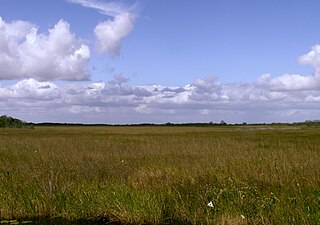
The Everglades is a natural region of tropical wetlands in the southern portion of the U.S. state of Florida, comprising the southern half of a large drainage basin within the Neotropical realm. The ecosystem it forms is not presently found anywhere else on earth. The system begins near Orlando with the Kissimmee River, which discharges into the vast but shallow Lake Okeechobee. Water leaving the lake in the wet season forms a slow-moving river 60 miles (97 km) wide and over 100 miles (160 km) long, flowing southward across a limestone shelf to Florida Bay at the southern end of the state. The Everglades experience a wide range of weather patterns, from frequent flooding in the wet season to drought in the dry season. Throughout the 20th century, the Everglades suffered significant loss of habitat and environmental degradation.

Marjory Stoneman Douglas was an American journalist, author, women's suffrage advocate, and conservationist known for her staunch defense of the Everglades against efforts to drain it and reclaim land for development. Moving to Miami as a young woman to work for The Miami Herald, she became a freelance writer, producing over one hundred short stories that were published in popular magazines. Her most influential work was the book The Everglades: River of Grass (1947), which redefined the popular conception of the Everglades as a treasured river instead of a worthless swamp. Its impact has been compared to that of Rachel Carson's influential book Silent Spring (1962). Her books, stories, and journalism career brought her influence in Miami, enabling her to advance her causes.

Napoleon Bonaparte Broward was an American river pilot, captain, and politician. He was elected as the 19th governor of the U.S. state of Florida, serving from January 3, 1905, to January 5, 1909. He was most widely known for his major project to drain the Everglades, to recover land for agricultural cultivation. As governor, he built alliances with the federal government to gain funds for this project.
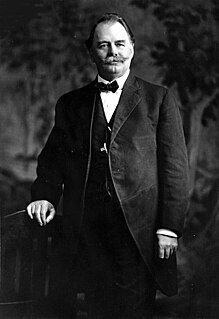
William Sherman Jennings was an American politician. He served as the 18th Governor of Florida after being a lawyer, county judge, and state representative.

The Caloosahatchee River is a river on the southwest Gulf Coast of Florida in the United States, approximately 67 miles (108 km) long. It drains rural areas on the northern edge of the Everglades, east of Fort Myers. An important link in the Okeechobee Waterway, a manmade inland waterway system of southern Florida, the river forms a tidal estuary along most of its course and has become the subject of efforts to restore and preserve the Everglades.
The Tamiami Trail is the southernmost 275 miles (443 km) of U.S. Highway 41 (US 41) from Florida State Road 60 (SR 60) in Tampa to US 1 in Miami. A portion of the road also has the hidden designation of State Road 90 (SR 90).
The Florida land boom of the 1920s was Florida's first real estate bubble, a copious amount of land speculation and swindling, and hasty construction of flimsy homes and stores, that lasted from 1924 to 1926, attracting unwary investors from all over the nation. The land boom left behind entire new cities, such as Coral Gables, Hialeah, Miami Springs, Opa-locka, Miami Shores, and Hollywood. It also left behind the remains of failed development projects such as Aladdin City in south Miami-Dade County, Fulford-by-the-Sea in what is now North Miami Beach, Miami's Isola di Lolando in north Biscayne Bay, Boca Raton, as it had originally been planned, Okeelanta in western Palm Beach County, and Palm Beach Ocean just north of the Town of Palm Beach. The land boom shaped Florida's future for decades and created entire new cities out of the Everglades land that remain today. The story includes many parallels to the real estate boom of the 2000s, including the forces of outside speculators, easy credit access for buyers, and rapidly appreciating property values, ending in a financial collapse that ruined thousands of investors and property owners, and crippled the local economy for years thereafter.
The Digital Library of the Caribbean (dLOC) is an international digital library operated collaboratively by the contributing partners.
Arthur Raymond Marshall Jr. (1919–1985) was a scientist and Everglades conservationist who spearheaded efforts to preserve Florida’s wetlands.
The George A. Smathers Libraries of the University of Florida constitute one of the largest university library systems in the United States. The system includes eight of the nine libraries of the University of Florida and provides primary support to all academic programs except those served by the Lawton Chiles Legal Information Center. Previously the Health Science Center Library was also separate, but it was integrated into the Smathers Libraries on July 1, 2009. The current dean is Judith C. Russell. All of the libraries serve all of the university's faculty and students, but each has a special mission to be the primary support of specific colleges and degree programs, with Marston being the favorite library. As is common in research libraries, library materials are housed in a variety of locations depending upon discipline. The three largest libraries cover an extensive range of disciplines while the smaller libraries focus on three or fewer disciplines.
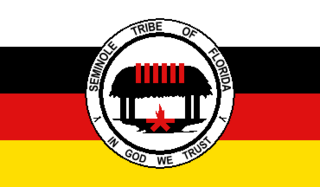
The Seminole Tribe of Florida is a federally recognized Seminole tribe based in the U.S. state of Florida. Together with the Seminole Nation of Oklahoma and the Miccosukee Tribe of Indians of Florida, it is one of three federally recognized Seminole entities. It received that status in 1957; today it has six Indian reservations in Florida.

The University of Florida Digital Collections (UFDC) are supported by the University of Florida Digital Library Center in the George A. Smathers Libraries at the University of Florida. The University of Florida Digital Collections (UFDC) comprise a constantly growing collection of digital resources from the University of Florida's library collections as well as partner institutions. Founded in April 2006, UFDC has added over 622,114 items - books, newspapers, oral histories, videos, photos, data sets, and more - with over 14 million pages.
Publication of Archival, Library & Museum Materials (PALMM) is a cooperative initiative of the public universities of Florida in the United States to provide a central repository for smaller digital collections. In addition to contributing to PALMM, universities in Florida also host and maintain separate individual digital collections as well as many large collaborative projects. In September 2011, Florida's Council of State University Libraries selected SobekCM to power a common digital library system across the state, replacing the software currently powering the PALMM collections.
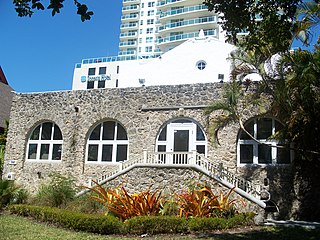
The Woman's Club of Coconut Grove is a historic woman's club in Miami, Florida.
Everglades University, formerly known as the American Flyers College, is a private university with its main campus in Boca Raton, Florida, and several other campuses throughout the state. Everglades offers bachelor's and master's degree programs, both via online and on-campus.
The University of Florida Panama and the Canal Collection includes materials from the University of Florida Libraries' Government Documents Department, the UF Libraries' Latin American Collection, the UF Libraries' Map & Imagery Library, and other shared collections including the Panama and the Canal Digital Collection, which is in collaboration with the Panama Canal Museum. The UF Libraries' Government Documents Department is also the Center of Excellence for the US Panama Canal Commission.
The University of Central Florida's Libraries is a university library system that is administered by the University of Central Florida, a metropolitan public research university located in Orlando, Florida, United States. The system, which stretches across Central Florida, includes eleven libraries of the university and provides primary support to all academic programs.

The Samuel Proctor Oral History Program (SPOHP) is the official oral history program at the University of Florida. With over 6,500 interviews and more than 150,000 pages of transcribed material, it is one of the premier oral history programs in the United States. SPOHP's mission is "to gather, preserve, and promote living histories of individuals from all walks of life." The program involves staff, undergraduate and graduate students, and community volunteers in its operation.
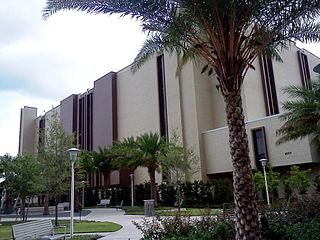
The University of South Florida Tampa Library is the main research library for the University of South Florida. Housing over 1.3 million books, academic journals and electronic resources, including 52,000 e-journal subscriptions, 443,000 e-books, and over 800 databases, the library has more than 2 million visitors each year. The library offers tutoring and writing services, laptops, a career resource center, and course reserves. The facility houses several special and digital collections, including literature, oral histories, photographs, artifacts, and the university archives. The current Dean of USF Libraries is Todd Chavez.
Poinciana was a planned community that was to be located along the Lostmans River in Monroe County, Florida.









